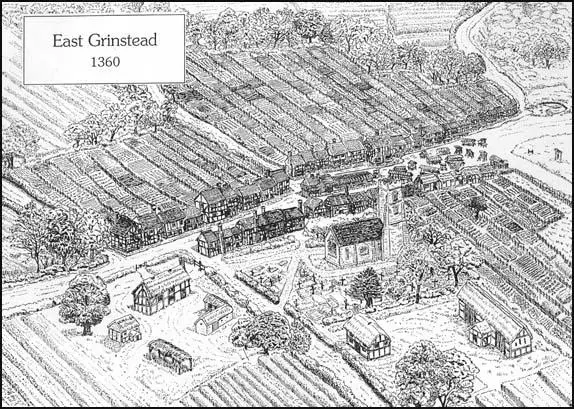Sanitary Conditions in Towns
Towns in the 14th century were unhealthy places. Most houses were small and contained only a couple of rooms. Sanitary arrangements were very primitive and usually involved having a bucket in the corner of the living room. Efforts were made to persuade people to dig garderobe pits' in their gardens. Others used their waste as manure for their crops growing on their portland plots. However, some people emptied the contents of their buckets onto the street outside.
There were no drains or pipes to carry away dirty water and rotting sewage. The main method of drainage were ditches along the sides of the houses. The government passed a law that forbade the throwing of filth and garbage into ditches and rivers. However, this law was usually ignored.
In East Grinstead one of these ditches ran down the side of Hermitage Lane. On the other side of the road there was another ditch that eventually reached a stream behind the church and entered the Medway at Old Mill Bridge. The river was also polluted by local workers. Tanners, for example, often cleaned their animal skins in the local river which resulted in tannic acid, lime, blood and fat entering the water supply.
Shopkeepers also dumped their rubbish onto the streets. Butchers often slaughtered animals outside their shops and then left the entrails and offal in the street. The rotting and germ-infested refuse would stay in the streets until it was eaten by pigs owned by people living in East Grinstead or it was washed away by a violent rainstorm. Most of this rubbish ended up in a foul-smelling pond at the bottom of the High Street.

1. Look at the drawing of East Grinstead. Explain why rich people tended to build their houses on the High Street near the church.
2. Imagine you are visiting East Grinstead in 1360. Describe your walk down the High Street. Include in your account what you see, hear and smell.
3. Consider your life in Yalding. Would you have been tempted to run away and live in East Grinstead? Write down the arguments for and against moving to East Grinstead. If you decide it is a good idea to move to East Grinstead explain what work you would try to do. Where would you live? Why might some people living in East Grinstead be unhappy about your decision to move to their town?
